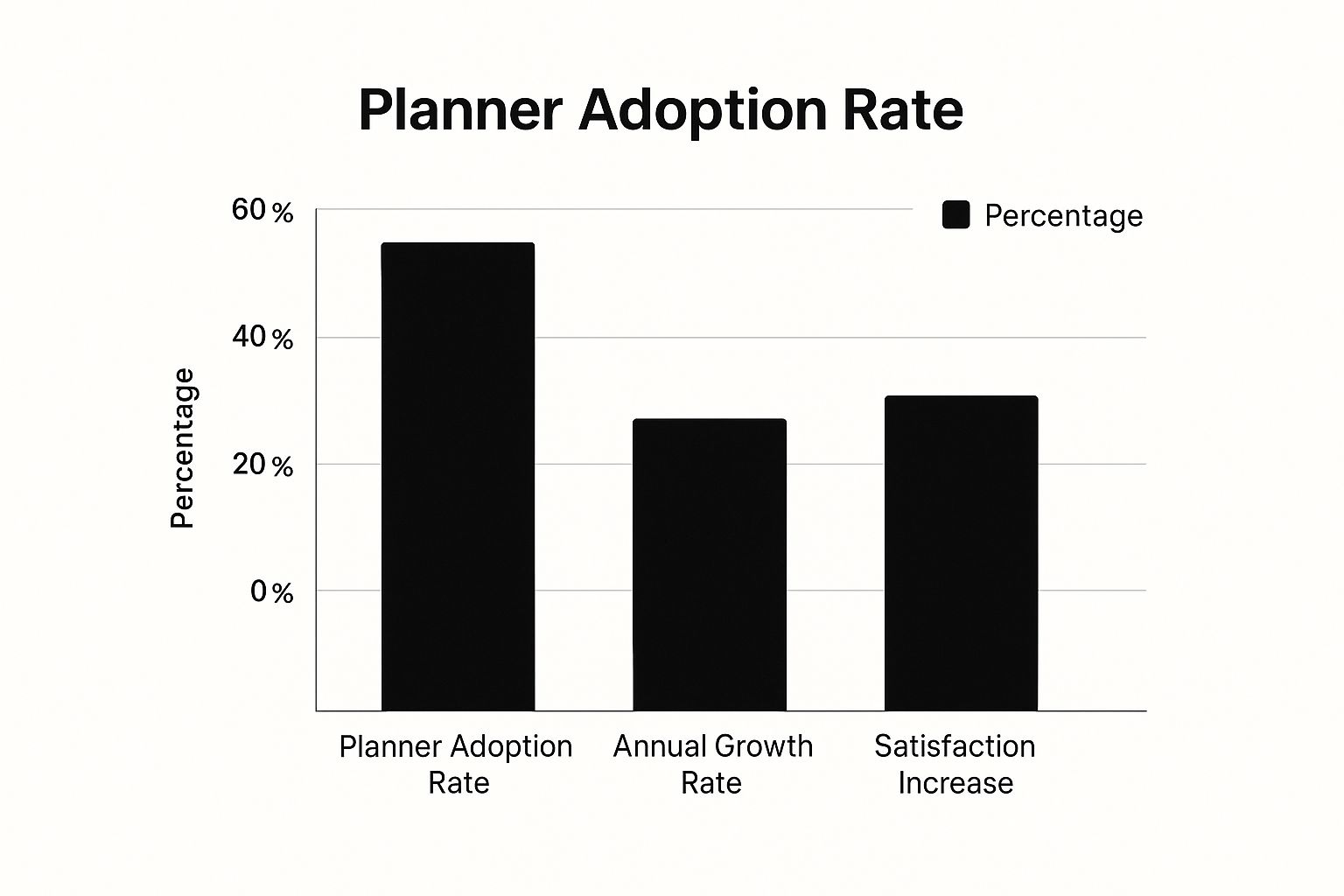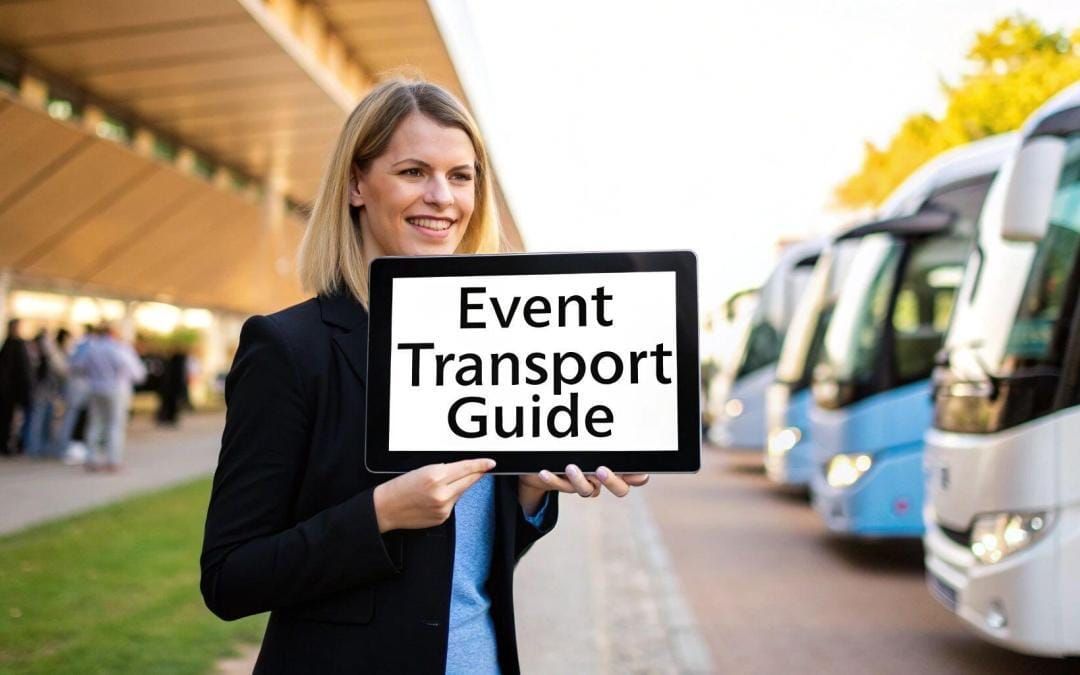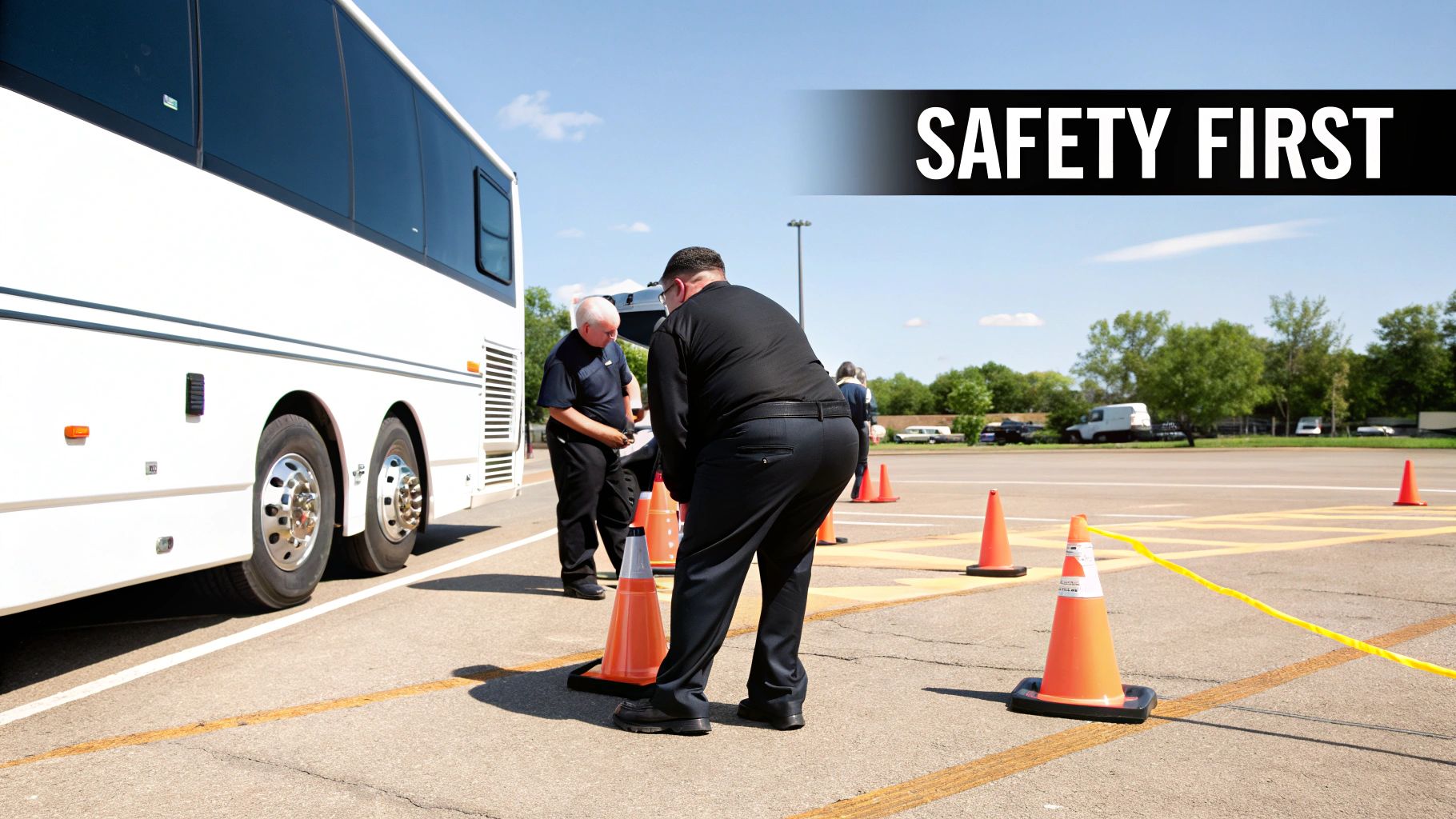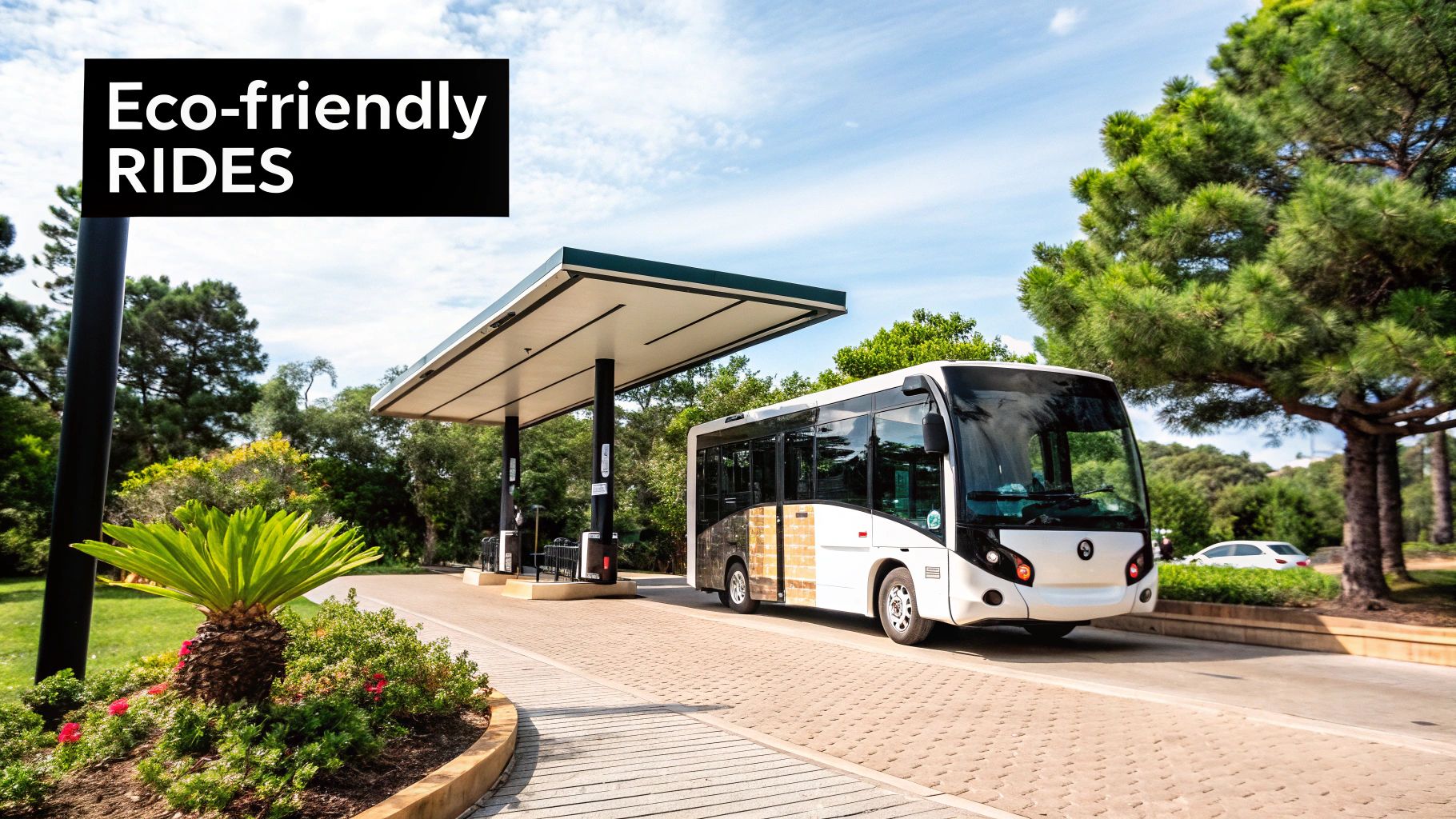Understanding What Your Event Actually Needs
Let’s be honest, generic event planning advice just doesn’t cut it. When it comes to UK transport, it’s about way more than just getting people from point A to point B. I’ve chatted with loads of event organizers, and the ones who really nail it are laser-focused on one thing: understanding their event’s specific transport needs. For example, a conference organizer in Manchester recently told me they ditched coaches in favor of local shuttles. Their venue was central, and delegates were all staying within a couple of miles, so coaches would’ve been a nightmare, adding to traffic rather than easing it.

This infographic shows how specialized event transport boosts satisfaction. It underscores how important careful planning really is.
Think about your guests. Are they mostly local, or are they coming from all over? A festival coordinator in Brighton told me about their clever solution for guests scattered across hotels and campsites: a mix of shuttle buses and pre-booked taxis. This gave them the flexibility to get everyone to the festival grounds without any hassle.
Timing is everything too. A daytime conference has totally different transport needs than an evening gala. Think about rush hour and potential delays. London traffic can add hours to a journey, so factor that in. If you’re up in the Scottish Highlands, be prepared for weather delays and have backup plans ready to go. The sheer number of events in the UK has a huge impact on transport. In 2023, the UK hosted around 1,016 exhibitions at major venues, bringing in nearly 7 million visitors—a record high since 2017. This surge in attendance puts pressure on transport infrastructure, making efficient and reliable event transport crucial. Learn more about UK event statistics.
Don’t Forget the Logistics
And don’t forget the behind-the-scenes stuff. Equipment, merch, even catering often need their own transport. Missing these details can create last-minute panic. Put yourself in your attendees’ shoes. Think about their entire journey, from the moment they arrive to the moment they leave. Anticipating their real needs, not just what you think they need, is the key to a smooth and successful event. This proactive approach will save you headaches and ensure everyone has a great time.
Here’s a handy table to help you visualize transport needs for different events:
Event Transport Needs Assessment Matrix: Compare transport requirements across different event types and guest profiles
| Event Type | Primary Transport Need | Peak Times | Special Requirements |
|---|---|---|---|
| City Conference | Local Shuttles, Taxis | Morning/Evening Rush Hour | Accessibility considerations, luggage transport |
| Rural Festival | Shuttle Buses, Pre-booked Transport | Arrival/Departure Days, Late Nights | Rough terrain access, weather contingency plans |
| Evening Gala | Private Cars, Limousines | Pre/Post Event | Designated drop-off/pick-up zones, valet parking |
| Suburban Wedding | Minibuses, Coaches | Ceremony Start/Reception End | Transport for bridal party, elderly guest assistance |
This table highlights how different events call for specific transport solutions. From city conferences needing accessible shuttles to rural festivals requiring weather contingency plans, considering these details upfront is key.
Finding Transport Providers You Can Trust
I’ve heard some real horror stories about event transport – coaches vanishing into thin air, drivers showing up ridiculously late, and vehicles that wouldn’t pass a basic safety check. Trust me, these logistical nightmares are not fun to deal with. Luckily, a little planning and some smart vetting can save you a whole lot of stress. It’s all about knowing how to find the true pros amongst the… less reliable options. You might be interested in: minibus hire with a driver.
Checking Credentials and Spotting Red Flags
Licensing and insurance are non-negotiables. Don’t be afraid to ask for a transport provider’s license number and then actually verify it on the relevant government website. It’s not being difficult; it’s being responsible. The same goes for insurance. Make sure their coverage is comprehensive and truly fits your event’s specific needs. A quick call to the insurer to confirm the policy’s validity is a smart move.
Also, pay attention to how they communicate from the get-go. Are they responsive and professional? Do they take the time to understand your event’s details, or do they just fire back a generic quote? Speaking of quotes, be wary of anything suspiciously cheap. Sometimes, those low prices come at the cost of cutting corners on safety, and that’s a risk you don’t want to take.
The Importance of Relationships and Reliability Tests
Especially during peak seasons, it’s wise to cultivate relationships with several event transport providers. Having backup options is invaluable if your first choice is booked solid or encounters unforeseen issues. And speaking of unforeseen issues, the UK transport scene is in a state of flux. By 2025, operational changes and funding limitations are expected to have a substantial impact on the industry, including event transportation. Think Great British Railways and the nationalization of some rail operators – big changes aimed at improving passenger experience and efficiency. Discover more insights on UK transport reform. This highlights the importance of having reliable providers you can trust to navigate these shifts.
Don’t just rely on what a company says they can do. Test their reliability firsthand. Book a smaller trip with them before your main event. It’s a low-cost way to get a feel for their service, punctuality, and communication style – a small price to pay for peace of mind.
Questions to Ask and Warning Signs to Watch For
Ask pointed questions to gauge a provider’s true capabilities. How do they manage unexpected delays? What’s their plan B if a vehicle breaks down? How do they keep drivers and passengers informed during the event? Their answers will reveal a lot about their professionalism and preparedness.
Red flags to watch out for? Providers who dodge questions, give vague answers, or push you to book quickly without giving you clear information. These are signs you should probably keep looking. Remember, your event’s success hinges on reliable transportation. Choosing the right provider can be the difference between a smooth, stress-free experience and a logistical headache. The time you invest in research now will definitely pay dividends later.
Smart Budgeting Without Nasty Surprises
Let’s be honest, event transport can really eat into your budget if you’re not careful. But don’t worry, there are definitely ways to keep those costs under control. Having worked with event planners all over the UK, I’ve picked up a few tricks I’m happy to share about realistic event transport expenses, from the initial quote to those pesky hidden extras.
Understanding Regional Price Differences
One thing I’ve learned is that budgeting for transport in London is a whole different ball game compared to other parts of the UK. Higher living costs, congestion charges, and just plain higher demand typically push London prices up. You might pay significantly more for a minibus in central London than you would in Birmingham, for example. And don’t forget about seasonal changes. Summer events, particularly during school holidays, often come with a premium price tag. Expect to factor that into your budget. Need some tips on saving? Check out this helpful guide: how to save money on minibus hire.
Cost-Cutting Strategies That Don’t Compromise Safety
Now, everyone loves saving money, but safety should always be your top priority. Never cut corners on crucial things like insurance or properly qualified drivers. Smart cost-cutting is about savvy negotiation and strategic booking. For instance, booking transport for multiple events with the same company can often lead to some great bulk discounts. That’s where building good relationships with your transport providers becomes invaluable.
Negotiation Tactics and Contingency Planning
Negotiating with providers doesn’t have to be stressful. Just be upfront about your budget and your specific needs. More often than not, they’re willing to work with you to find a solution that fits. And remember, a contingency fund is your best friend. Unexpected delays, route changes, or even last-minute guest additions can all impact your transport costs. Having a buffer of around 5-10% of your total transport budget can save you a lot of headaches (and keep your stakeholders happy!).
To give you a better sense of potential costs across the UK, I’ve put together this handy table:
UK Event Transport Cost Comparison
Typical pricing ranges for different transport services across UK regions
| Service Type | London Pricing | Regional Pricing | Peak Season Premium | Typical Extras |
|---|---|---|---|---|
| Standard Minibus (16 Seater) | £400 – £600 per day | £300 – £500 per day | 10-20% | Parking, waiting time, tolls |
| Executive Minibus (16 Seater) | £600 – £800 per day | £450 – £650 per day | 15-25% | Onboard refreshments, WiFi |
| Coach (50 Seater) | £800 – £1200 per day | £600 – £900 per day | 15-30% | Driver accommodation (for longer journeys) |
| Luxury Car Service | £30 – £50 per hour | £25 – £40 per hour | 10-15% | Gratuity, airport fees |
This table showcases the range of prices you might encounter, highlighting the higher costs typically associated with London and peak seasons. Remember these are estimates, and actual quotes will vary based on your specific needs.
Premium vs. Overpaying: Knowing the Difference
Sometimes, paying a premium is completely reasonable, like for specialized vehicles, VIP treatment, or complex logistics. But it’s crucial to know when you’re just being overcharged for a standard service. Do your homework, compare quotes from several providers, and don’t hesitate to ask questions. Understanding the market rate empowers you to negotiate effectively and ensures you’re getting real value. Ultimately, smart budgeting boils down to planning, preparation, and a dash of savvy negotiation. It’s about getting the transport you need at a price you can afford, without any unpleasant surprises along the way.
Booking Smart And Protecting Your Event
Booking transport for an event can be a real headache. So many organizers get tripped up because they’re not entirely sure what information transport companies need, or which parts of the contract are the really important ones. Let’s break down the entire process, from your initial enquiry to that final booking confirmation. I’ll sprinkle in some insights I’ve picked up from event professionals who’ve learned these lessons the hard way!
Getting the Quote Right and Understanding Timelines
First things first, your initial enquiry needs to be super clear. Give as much detail as you can about your event: dates, times, locations, the number of guests, and any accessibility requirements or other special needs. This helps providers give you an accurate quote based on reality, not a ballpark guess. Booking timelines can be very different depending on the event. For a massive conference in London, you’re probably looking at booking transport months in advance, especially if it’s during peak season. A smaller wedding in the Cotswolds might give you a bit more wiggle room. But no matter the size, booking early gives you more options and puts you in a stronger position to negotiate.
It’s also crucial to remember that inbound tourism has a big impact on UK event transport services. For example, VisitBritain projects the UK will see 43.4 million visits in 2025, spending a whopping £33.7 billion, which is a considerable jump from 2024. This influx of visitors increases demand for transport, making early booking even more essential.
Contracts, Cancellations, and Payments: The Nitty-Gritty
Your contract is your best friend. Don’t just skim it – read it. Pay close attention to the key clauses: what’s the cancellation policy? What are the insurance details? What about liability coverage? A solid contract protects both you and the transport provider. Cancellation policies should be fair and balanced. What happens if you cancel? What happens if they cancel? Having a clear payment schedule also helps you manage your budget. Avoid large upfront payments if you can. Negotiate a staged payment plan that works for your cash flow.
Flexibility and Managing Changes
Building some flexibility into your booking can save you from expensive surprises later on. Think about what happens if your event runs late. What if you suddenly need to add another pick-up location? Discuss these scenarios upfront and agree on a process for handling changes. This helps avoid unexpected add-on charges that can wreck your budget. A good provider will be happy to work with you, but clear communication is paramount.
The Power of Clear Communication
Regularly checking in with your transport provider is key, especially as your event gets closer. Keep them in the loop about any changes to guest numbers, timings, or logistics. Being proactive helps everyone stay on the same page and avoids miscommunication. Remember, booking event transport is a partnership. By understanding your needs, asking the right questions, and scrutinizing the contract details, you can ensure a smooth and stress-free experience for everyone. Treat your transport providers with respect; they are professionals. Value their time, give them accurate information, and communicate any changes promptly. This builds strong relationships and makes the whole process much smoother. A well-planned booking process is the foundation of successful event transport. By following these tips, you’ll dodge common problems and create a transport plan that runs like a well-oiled machine, leaving you free to focus on making your event truly memorable.
Managing Event Day Like A Professional
Perfect transport plans can go sideways fast if you don’t have your event-day coordination nailed down. Let’s be real, managing transport when everything’s live—traffic jams, last-minute guest changes, and the inevitable curveballs—can be intense. This is when a solid plan becomes your lifeline.
Communication is Key: Staying Connected Under Pressure
A reliable communication system is everything. Think dedicated WhatsApp groups for drivers, coordinators, and key event staff. This allows for real-time updates, quick problem-solving, and keeps everyone in the loop. I remember one event where a motorway closure completely derailed our carefully planned schedule. Because we had a clear communication system, we rerouted the coaches, kept guests informed, and minimized the disruption. Stressful? Absolutely. But manageable, thanks to good communication.
Coordinators on the Ground: Your Event-Day Heroes
Strategically placed transport coordinators are game-changers. They’re your boots on the ground, managing passenger flow, handling unexpected hiccups, and making sure everyone gets where they need to be. For a large conference I organized in Birmingham, we stationed coordinators at key transport hubs. They were armed with radios, passenger lists, and a healthy dose of patience! They were invaluable in ensuring the smooth arrival of hundreds of delegates.
Managing Expectations: When Things Don’t Go as Planned
Let’s face it: sometimes, despite meticulous planning, things just happen. A flight delay, a sudden downpour, or a monster traffic jam can throw a wrench in the works. This is where managing passenger expectations becomes crucial. Keep guests informed about any delays, provide regular updates, and, if possible, offer alternative solutions. A little empathy and transparency go a long way in keeping spirits high.
Timing Strategies: Accounting for Real-World Variables
Remember to consider the practicalities of UK travel. London traffic is famously unpredictable, while Scottish weather can turn on a dime. Build in buffer time, especially during peak hours. For an event in Edinburgh, we factored in extra travel time because of the festival crowds and potential road closures. This prevented delays and meant guests arrived on time and relaxed.
VIP Treatment Without Disrupting the Flow
If you have VIP guests, you’ll need to cater to their needs without disrupting everyone else. Dedicated vehicles, separate pick-up/drop-off points, and maybe even a dedicated coordinator can ensure VIPs receive the attention they require without creating a logistical nightmare. This takes careful coordination and clear communication with your event transport services provider for a seamless experience across the board.
Departure Coordination: Ending on a High Note
Don’t overlook departure coordination! Clear signage, designated pick-up areas, and efficient loading procedures prevent chaos and ensure a smooth exit. For a large festival, we used color-coded wristbands for different departure locations. This streamlined the process and avoided the usual end-of-event scramble. A smooth departure makes a great last impression, leaving attendees with positive memories. A solid plan for managing your event transport services minimizes stress and contributes to a great experience for everyone.
Handling Complex Requirements With Confidence
Every event throws up its own transport curveballs. One minute you need wheelchair access, the next you’re dealing with international guests navigating the UK’s sometimes baffling public transport system. Then there’s bulky equipment, VIP security… the list goes on. Trust me, I’ve seen it all firsthand, and good planning is the only thing that stands between chaos and a smooth operation.
Accessibility and Mixed-Mobility Groups
Let’s talk accessibility. In the UK, the law is crystal clear: your event transport must be accessible to guests with disabilities. This isn’t just a nice-to-have, it’s a legal must-do. I remember working a conference in Cardiff where several attendees used wheelchairs. We booked minibuses with ramps and dedicated wheelchair spaces and liaised with the venue to guarantee seamless access throughout. It was a small thing, but it made a world of difference.
Mixed-mobility groups are another kettle of fish entirely. Think about a family reunion – elderly relatives, toddlers, and everyone in between. One-size-fits-all transport just won’t cut it. You might need a mix of minibuses, accessible taxis, and even pre-booked car services. It’s about finding that perfect blend. For some extra pointers on planning travel for groups, check out our guide on essential questions before hiring a minibus.
Logistics and Venue Coordination
Loading logistics? A potential nightmare without proper venue coordination. I’ve seen transport arrive at venues only to discover there’s nowhere to park or unload. This happens a lot in bustling city centers like London or Manchester. The solution? Talk to the venue. Discuss access routes, loading zones, and parking well in advance. It saves a ton of last-minute stress. We once managed an event at a historic venue in York with tiny streets. We arranged a staggered arrival schedule to avoid gridlock. The extra planning was worth it to avoid major delays.
Security and Late-Night Departures
VIP security requires a delicate touch. You need to provide protection without making anyone feel like a second-class citizen. Discreet, separate transport often does the trick. For a corporate event with some very high-profile guests, we used unmarked executive cars. It ensured their safety and privacy without drawing unwanted attention.
Late-night departures? Another area needing special attention. Well-lit and clearly marked pick-up areas are essential, along with staff to guide guests and manage crowds. A good event transport provider will handle these logistics, ensuring everyone gets home safe and sound. We once used staggered departure times based on camping zones for a music festival. It prevented transport hubs from being overwhelmed and got everyone home safely and quickly, even after a long day.
Remember, complex transport requirements aren’t impossible to manage. With thorough planning, open communication, and a dependable transport company, you can tackle anything and ensure a smooth, successful event for all. Don’t be afraid to get creative and tailor solutions to your event’s specific needs. That’s where a seasoned transport provider who truly understands UK transport becomes invaluable.
Your Transport Success Blueprint
Planning event transport can feel overwhelming, but trust me, it doesn’t have to be. Think of this as your go-to guide, your personal roadmap to smooth and stress-free transportation, no matter the size of your event. Whether you’re organizing a small get-together in Bath or a massive conference in London, this blueprint will help you nail it. I’ve been there, done that, and learned a thing or two along the way, so I’m happy to share some practical tips and real-world examples.
This screenshot shows the UK government site discussing Public Service Vehicle (PSV) Operator Licences. One crucial piece of advice? Always, always verify your transport provider’s licensing. This screenshot highlights the UK government’s resource on PSV Operator Licences. Overlooking this could lead to major headaches if anything goes wrong, so double-checking is a must.
This plan is designed with clear success markers and troubleshooting tips. So, whether you’re managing a corporate event, a lively festival, a formal conference, or even a private party, this will work for you. Let’s dive into the details.
Planning and Communication
- Templates: Let’s face it, emailing vendors back and forth can be a time suck. Using pre-written email templates is a game-changer. They not only save you precious time but also ensure you don’t miss any vital details like pickup/drop-off locations, timings, or special guest needs. I’ve created a few myself that I use religiously.
- Checkpoints: Staying organized is half the battle. Setting up a timeline with key milestones (think confirming bookings, finalizing guest lists, and that final check-in with your transport provider a few days before the event) is essential for keeping everything on track. I like to use Trello for this – it keeps everything visually organized.
Budgeting and Cost Control
- Realistic Budget: Don’t fall into the trap of guessing at transport costs. Use online tools or reach out to providers for accurate quotes. And here’s a pro tip: remember those hidden costs! Factor in things like parking fees, tolls, and driver waiting time, especially if your event is in a bustling city center. London, I’m looking at you!
- Contingency: Trust me, having a contingency budget of 10% is your best friend. It’s your safety net for those unexpected bumps in the road – last-minute route changes, extra vehicles needed if your guest list suddenly grows, you name it. It’s always better to be safe than sorry.
Day-of Coordination and Troubleshooting
- Communication System: Setting up a dedicated WhatsApp group for your transport team is a lifesaver. It allows for real-time updates and quick solutions if any hiccups arise. This proved invaluable at a recent conference I organized when a sudden road closure meant we needed to reroute our buses on the fly.
- Troubleshooting: Always have a plan B. Seriously. What happens if a vehicle breaks down or a driver doesn’t show? Having backup contact information for other transport providers or a prearranged agreement with local taxi services can save the day.
Need help with your UK event transport? West London Minibus Hire offers reliable minibus hire with a driver across London and the UK for events of all sizes. Get a free, no-obligation quote today!


